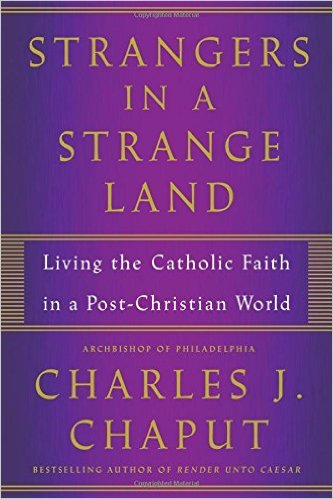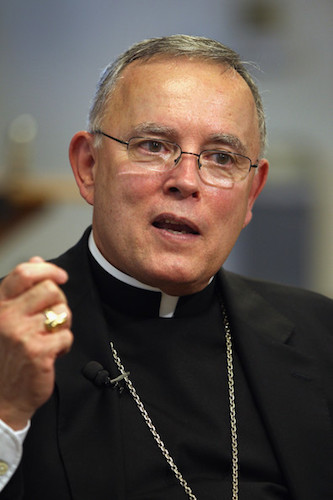A student once told me during a class on Aristotle’s Ethics that everyone he knew wanted to live somewhere else. He’d been living in Boulder, Colorado, which has to rank among the best and most beautiful places to live on Earth. We were discussing how Aristotle formulates ethical principles from actual practices, by purifying them, drawing out what’s best for human flourishing from how people actually live in concrete relation to one another. The whole class agreed that the impulse to flee where you live – so common in America and much of the developed world today – reflects some deep cultural disturbance.
That’s the basic condition Archbishop Charles J. Chaput confronts in his just published book, Strangers in a Strange Land: Living the Catholic Faith in a Post-Christian World. As the title makes clear, he is, of course, presenting a Catholic response to our general social alienation. At the same time, he plays a bit with the notion of “post-Christian.” In one way, the loss of Biblical foundations in the West lies at the heart of our restlessness and emptiness. We live in, arguably, the freest, wealthiest society the world has ever known. Still, as St. Augustine and many other great figures have noted, things cannot satisfy beings like ourselves, who are made for God.
But in another way, Chaput suggests, there is no such thing as “post-Christian,” because the world can never really forget Christ. Indeed, the very furiousness with which many today are trying to do so – declaring certain Christian beliefs on sex and marriage as virtual hate crimes, destroying historical memory in school curricula, defining what is and isn’t human, and pressuring Christian institutions – testifies to the persistence of Christ: “as people and cultures turn away from their former convictions, reminders of the past become more haunting and more irritating.” Paradoxically, the animus against Christianity witnesses to its continued, if precarious, power.
Many people have recently worked this same ground, but none more astutely and with such breadth of cultural reference. Chaput brings together some of the very best secular as well as religious thinking about our situation: the American Founders, Tocqueville, Charles Péguy, Romano Guardini, Pierre Manent, Leon Kass, Charles Murray, Alasdair MacIntyre, even the great German poet Rilke, and many others. No brief account can do this book full justice. You have to read it, slowly, to appreciate its richness and texture.
But the wide-ranging social analysis is just a preliminary. The central question for us, right now, is what can be done. The answer, the Christian answer, is that there may not be much we can do on a large scale. But what we can do, however modest, we must do. Visiting the sick or dying, maintaining solid families and marriages, having the courage to speak when some human value is violated, being willing even to talk about God, in the right way, amidst a culture that wants, above all things, not to hear the name. Political action, too, as needed. The possibilities are infinite. And we cannot complain that “the times” are evil, because we are the times.
But even that is not enough. Chaput transports all these considerations into a different key by reminding us that the true Christian response to our predicaments is to live in Hope. Hope is not optimism – a foolish thing in a world so obviously wounded by sin and folly. Neither is it confidence in Progress, that 19th Century counterfeit. We have Hope, true Hope, he says, because 2000 years ago, in an obscure regional capital, a man – Jesus – rose from the dead, and defeated the world, the flesh, and – let’s say this openly – the Devil.
The world scoffs at such things, of course, and always has. There are a number of intellectual battles that must be fought to dispel wrongheaded scientific, social, and cultural assumptions. Perhaps the most challenging problem, however, is that the people who most need to hear such arguments are now virtually impervious to reasoning because of the way they have been conditioned to live. Chaput remarks, “The more problematic the behavior, the more sacred grows the liturgy of alibis.”
In some ways, our situation is novel, but not as novel as we might imagine: “Christianity was born in a world of abortion, infanticide, sexual confusion, and promiscuity, the abuse of power and the exploitation of the poor.” We need to respond to these evils, not only with arguments, but even more urgently, by the way we live, as Christian adults, in the world but not of it – politicians, doctors, university presidents and professors, scientists, business executives – willing to maintain and, if necessary, pay the price for living in truth.
We can’t withdraw. That’s not the way of a faith that believes God Himself became incarnate in our world. And the modern state will come after us anyway. It’s a delicate balancing act to be in the world but not of it. A Christian is partly an alien in any country, as the famous Epistle to Diognetus says, because no earthly realm will be fully Christian.
Catholics lost sight of this as they grew comfortable in an America that offers many allurements. Chaput devotes a chapter to examining the Beatitudes as a kind of blueprint for what types of aliens we must be. And another chapter to what type of institution the Church then must be, “The ‘power’ of the Church resides not in her public statements or material resources, her structures or social services, but in her ability to form and lead her people – and to be their first loyalty.”
To lead the faithful and be a leaven in the world, it’s crucial that the Church have her own interior dimension rooted in charity, fidelity, and friendship inside and outside the Church. We talk much about dialogue and being open to the world. But to be a dialogue partner, you must, yourself, have something to say.
The Archbishop of Philadelphia has plenty to say. Read him.
















